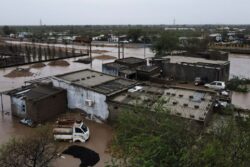Alappuzha, Panaji, Mysuru Cleanest Cities in India: CSE Survey


New Delhi: Alappuzha in Kerala, Panaji and Mysuru are cleanest cities in India, a survey based on solid waste management practises in towns across the country on Monday said even as it placed Delhi at the “bottom of the heap”.
“Alappuzha, Panaji and Mysuru are three of the cleanest cities in India, with municipal waste management systems that actually work,” a latest rating by Centre for Science and Environment (CSE) said.
CSE’s report on solid waste management in Indian cities, titled ‘Not in my backyard’ was released on Monday.
“CSE rated Indian cities on their management of solid waste – metros like Delhi feature at the bottom of the heap,” it said.
“This book started as a survey, we wanted to simply know which city is India’s cleanest. We knew that once we found out which is the cleanest, we would also find out what makes it so. This would give us the answers for future policy,” said CSE Director General Sunita Narain.
Noting that the last survey to understand quantity and composition of garbage was done over a decade ago, CSE said that the methodology used to calculate waste generated is to simply extrapolate an assumed quantity estimate with the population.
“There is, however, no real on-ground data available. In addition, not much information is available on the composition of waste in terms of organic, bio-degradable, or plastic, or the quantum. In essence, what had started as a survey was turning out into a gap analysis,” CSE said.
Referring to the Department of Economic Affairs position paper on solid waste management of 2009, CSE said that urban India was already producing some 80,000 MT of waste a day. It projected that by 2047, India would be producing 260 million tonnes of waste annually needing over 1,400 sq km of landfills which is an area equal to Hyderabad, Mumbai and Chennai put together, CSE said referring to the paper.
Referring to the 2007 report of the Comptroller and Auditor General of India (CAG), CSE said that the report found waste was collected in 22 per cent of 56 sampled municipalities, segregation was done in 10 per cent, storage in 17 per cent, transportation using covered trucks was done in 18 per cent of the sampled municipalities and only 11 per cent had waste processing capabilities.
According to Central Pollution Control Board (CPCB) estimates, over 90 per cent of Indian cities with a functional collection system dispose of their waste in landfills, CSE said.
It said that in 2008, CPCB’s monitoring of cities found that 24 out of 59 cities were making use of landfills, covering 1,900 hectares of land while another 17 planned to create landfills.
“As India becomes more literate and politically aware, most cities are encountering stiff resistance when they attempt to dispose of waste in somebody else’s backyard. In Pune, Bengaluru, Panaji, Alleppey and Gurugram, village communities have been up in arms against the dumping of waste by a neighbouring city.
“This resistance will continue to grow. Cities are also finding it difficult to secure ‘environmental approval’ for their landfills,” said CSE Deputy Director General Chandra Bhushan.
Narain said the problem is two-fold – one households and institutions are not responsible for management, through segregation or payment of the waste they generate and two, there is an absolute collapse of financial and institutional (human) capacity and so accountability in our municipal systems.
“In this scenario, the best option is what we have found exists in Kerala, where municipalities have withdrawn from the waste business. People segregate and compost and informal recyclers collect and sell.
“This is perhaps the most exciting model for future waste business in the country. And even if it cannot be emulated completely, it holds important lessons for other cities,” she said.





